ELAR 1.1
Developing and sustaining foundational language skills: listening, speaking, discussion, and thinking--oral language. The student develops oral language through listening, speaking, and discussion. The student is expected to:
- (1) Author's purpose and craft: listening, speaking, reading, writing, and thinking using multiple texts. The student uses critical inquiry to analyze the authors' choices and how they influence and communicate meaning within a variety of texts. The student analyzes and applies author's craft purposefully in order to develop his or her own products and performances. The student is expected to:
- (2) discuss the author's purpose for writing text;
- (A) discuss how the use of text structure contributes to the author's purpose;
- (B) discuss with adult assistance the author's use of print and graphic features to achieve specific purposes;
- (C) discuss how the author uses words that help the reader visualize; and
- (D) listen to and experience first- and third-person texts.
- (E) Composition: listening, speaking, reading, writing, and thinking using multiple texts--writing process. The student uses the writing process recursively to compose multiple texts that are legible and uses appropriate conventions. The student is expected to:
- (3) plan a first draft by generating ideas for writing
such as by drawing and brainstorming;
- (A) develop drafts in oral, pictorial, or written form by:
- (B) organizing with structure; and
- (i) developing an idea with specific and relevant details;
- (ii) revise drafts by adding details in pictures or words;
- (C) edit drafts using standard English conventions, including:
- (D) complete sentences with subject-verb agreement;
- (i) past and present verb tense;
- (ii) singular, plural, common, and proper nouns;
- (iii) adjectives, including articles;
- (iv) punctuation marks at the end of declarative, exclamatory, and interrogative sentences; and
- (v) adverbs that convey time;
- (vi) prepositions;
- (vii) pronouns, including subjective, objective, and possessive cases;
- (viii) capitalization for the beginning of sentences and the pronoun "I";
- (ix) correct spelling of words with grade-appropriate orthographic patterns and rules and high-frequency words with adult assistance; and
- (x) publish and share writing.
- (E) Composition: listening, speaking, reading, writing, and thinking using multiple texts--genres. The student uses genre characteristics and craft to compose multiple texts that are meaningful. The student is expected to:
- (4) dictate or compose literary texts, including
personal narratives and poetry;
- (A) dictate or compose informational texts, including procedural texts; and
- (B) dictate or compose correspondence such as thank you notes or letters.
- (C) Inquiry and research: listening, speaking, reading, writing, and thinking using multiple texts. The student engages in both short-term and sustained recursive inquiry processes for a variety of purposes. The student is expected to:
- (5) generate questions for formal and informal inquiry
with adult assistance;
- (A) develop and follow a research plan with adult assistance;
- (B) identify and gather relevant sources and information to answer the questions with adult assistance;
- (C) demonstrate understanding of information gathered with adult assistance; and
- (D) use an appropriate mode of delivery, whether written, oral, or multimodal, to present results.
- (E) listen actively, ask relevant questions to clarify information, and answer questions using multi-word responses;
- (F) follow, restate, and give oral instructions that involve a short, related sequence of actions;
- (G) share information and ideas about the topic under discussion, speaking clearly at an appropriate pace and using the conventions of language;
- (H) work collaboratively with others by following agreed-upon rules for discussion, including listening to others, speaking when recognized, and making appropriate contributions; and
- (I) develop social communication such as introducing himself/herself and others, relating experiences to a classmate, and expressing needs and feelings.
- Free Plan
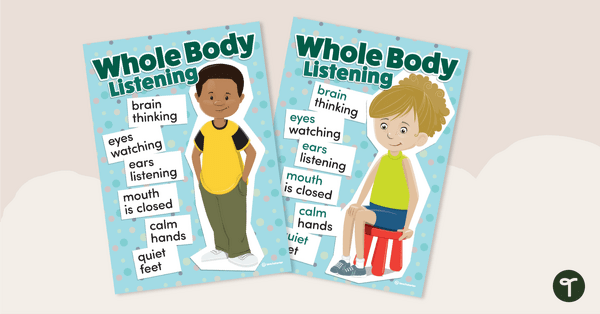
Whole Body Listening Posters
A set of posters highlighting the characteristics of a good listener.
- Free Plan
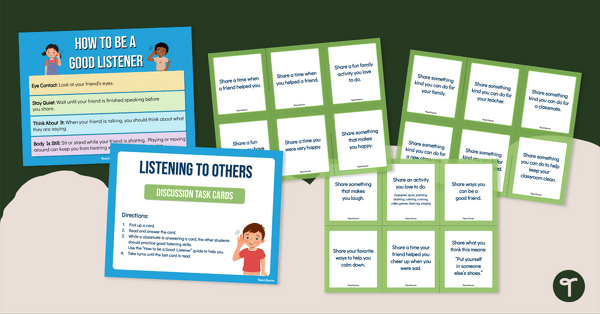
Listening to Others – Discussion Task Cards and Poster
Give students the opportunity to work on their listening skills and learn what it means to be a good listener with this set of 42 discussion cards and classroom poster.
- Free Plan
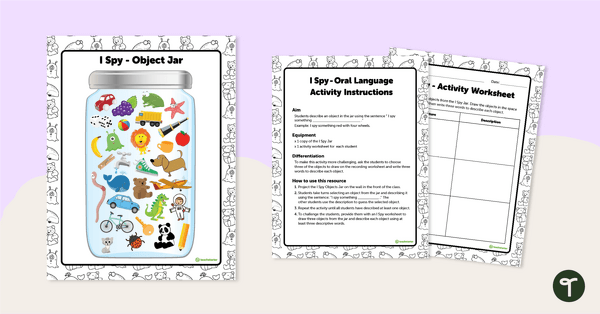
I Spy Oral Language Activity
Encourage the development of oral language with this fun "I Spy" activity.
- Plus Plan
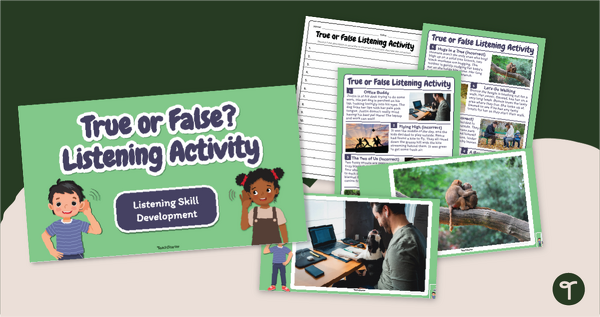
True or False? Active Listening Exercises
Improve listening skills in the classroom with an engaging True or False Active Listening Activity.
- Plus Plan
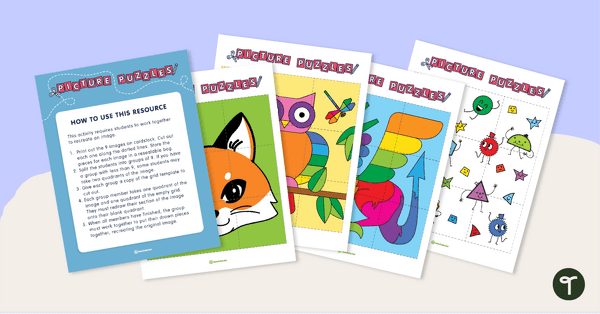
Picture Puzzles - Team Building Activities
A set of 10 picture puzzles to use as a team-building activity.
- Plus Plan
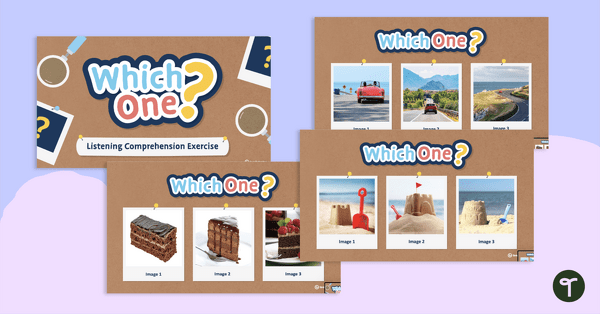
Which One? – Listening Comprehension Exercise
An Interactive PowerPoint where students listen to a description and choose the matching image.
- Plus Plan
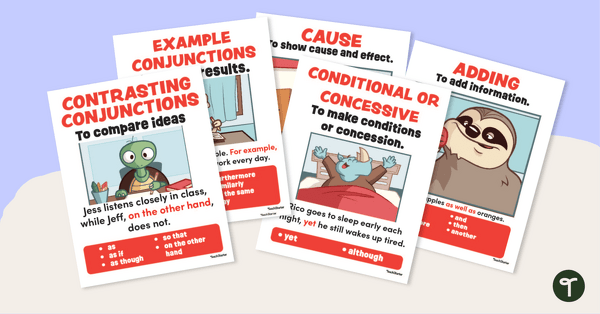
Sentence Conjunctions Posters for Lower Elementary Students
Display this set of 8 grammar posters to teach students about sentence connectives and conjunctions.
- Plus Plan
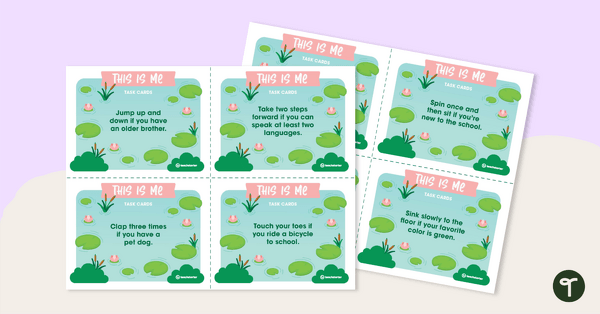
This Is Me Task Cards
Get to know your students on the first days of a new school year with this fun getting-to-know-you game.
- Plus Plan
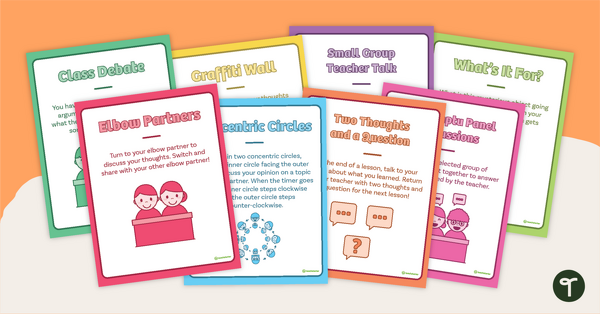
Student-Led Discussion Strategies Poster Pack
Describe student-led discussion strategies with this set of 8 posters.
- Plus Plan
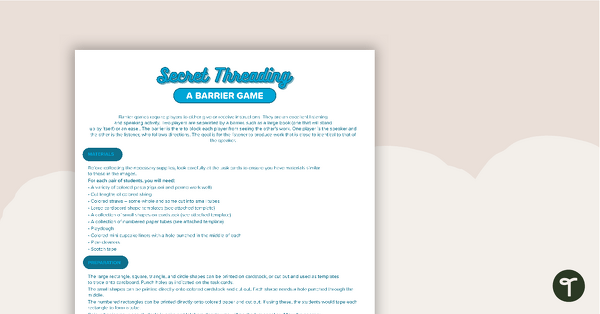
Secret Threading Task Cards
Practice listening and speaking skills with this fun barrier activity.
- Plus Plan
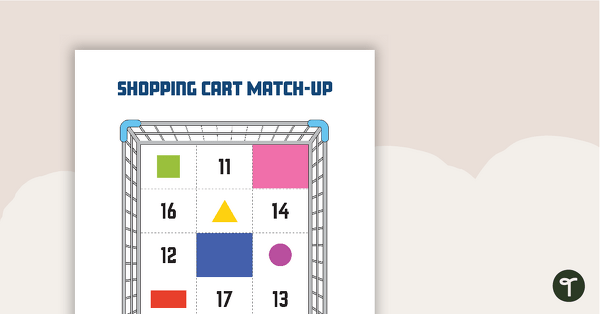
Shopping Cart Matchup Activity
A speaking and listening activity to reinforce a variety of mathematical concepts.
- Plus Plan
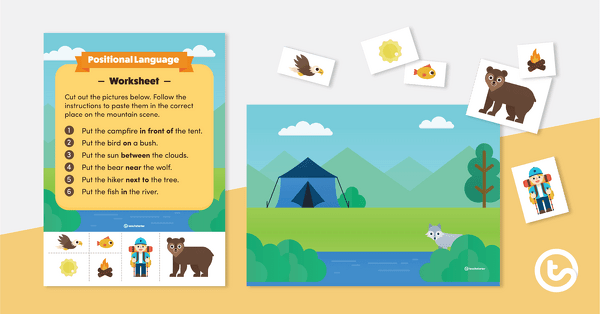
Positional Language Activity – The Campground
An activity to use when teaching younger students about positional language.
- Plus Plan
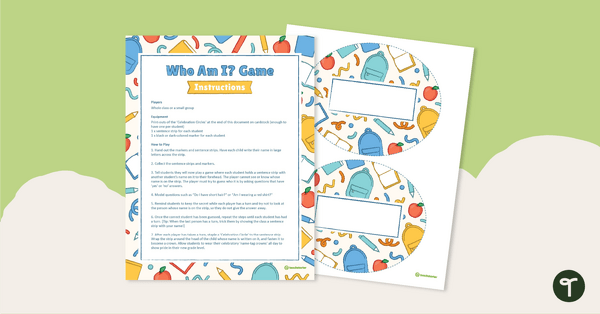
Who Am I? Icebreaker Game
Make day 1 a success with this fun icebreaker game.
- Plus Plan
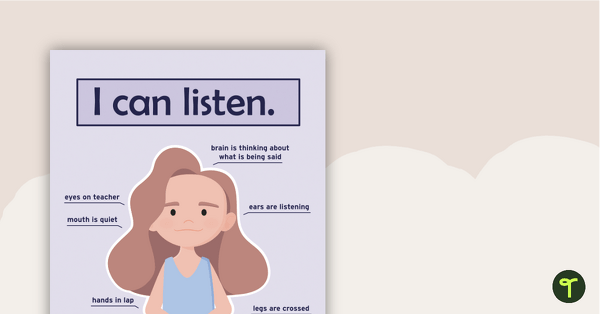
I Can Listen Poster
A poster to scaffold appropriate behavior for students when listening in class.
- Plus Plan
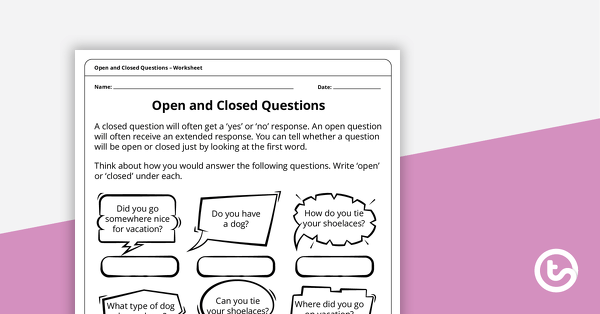
Open and Closed Questions – Worksheet
A worksheet for students to demonstrate their knowledge of open and closed questions.
- Plus Plan
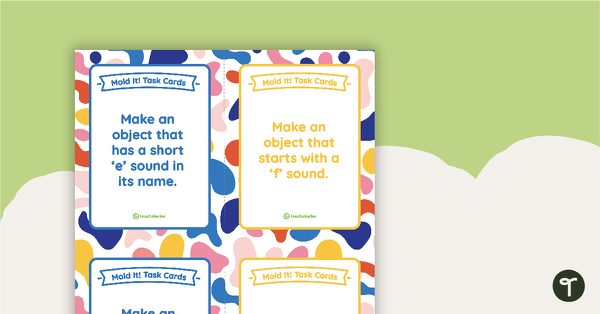
Mold It! Task Cards
A set of 28 task cards to use with modeling clay.
- Plus Plan
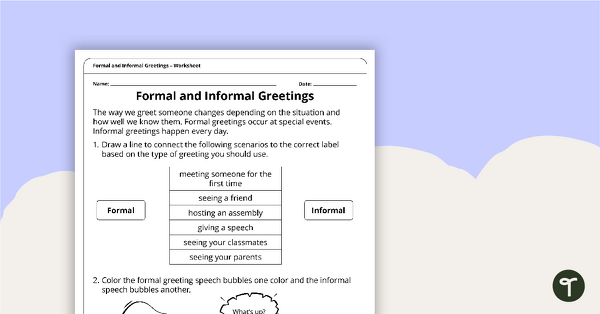
Formal and Informal Greetings – Worksheet
A sorting worksheet where students distinguish the differences between formal and informal greetings.
- Plus Plan
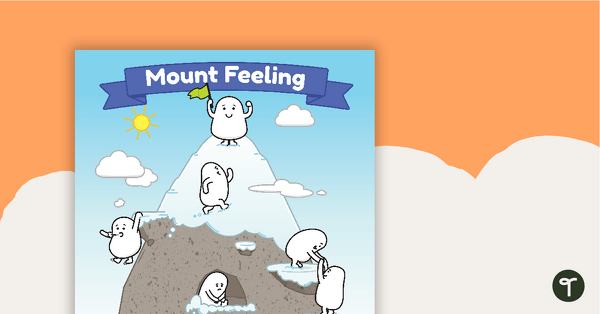
Mount Feeling - Feelings Poster and Flashcards
Mount Feeling poster and flashcards to help students vocalize how they are feeling using a visual aid.
- Plus Plan
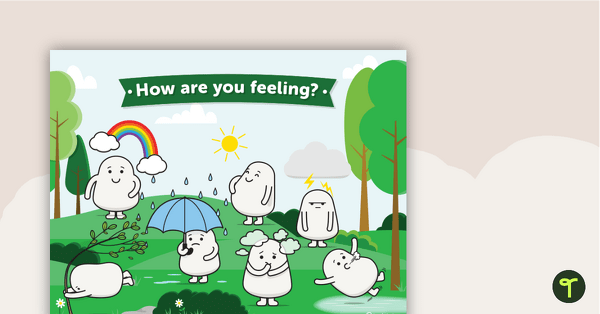
Weather-Themed How Are You Feeling? Poster and Flashcards
A visual resource to help students verbalize how they are feeling.
- Plus Plan
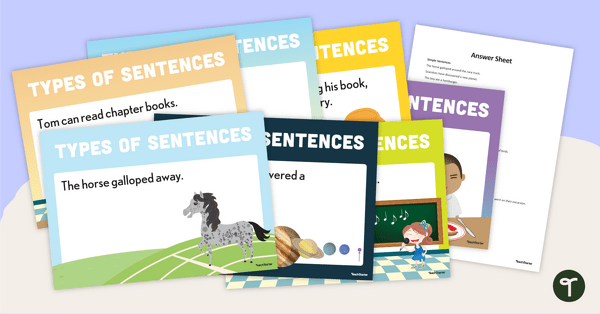
Simple, Compound and Complex Sentences Flashcards
Use this set of 16 colorful flashcards to introduce students to the attributes that make up simple, compound and complex sentences.
- Plus Plan
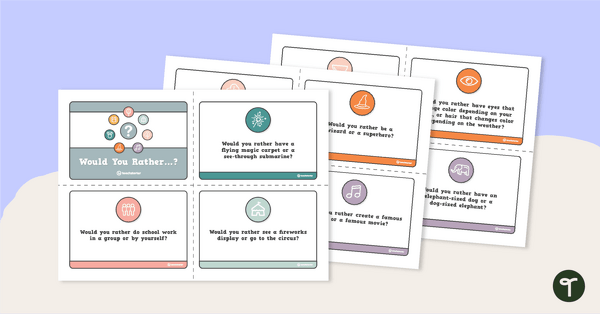
Would You Rather...? Question Cards
Would You Rather use this set of 31 question cards or eat a can of worms?
- Plus Plan
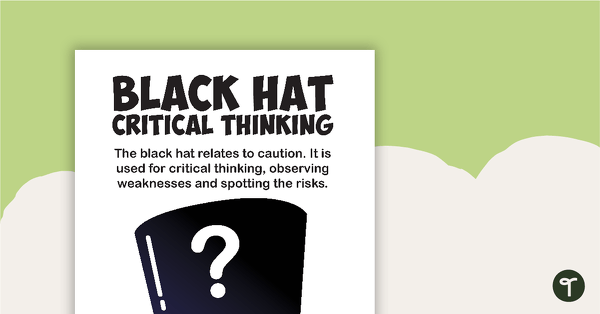
Thinking Hats for Effective Group Work
Thinking Hats based on Dr. Edward de Bono's teachings.
- Plus Plan
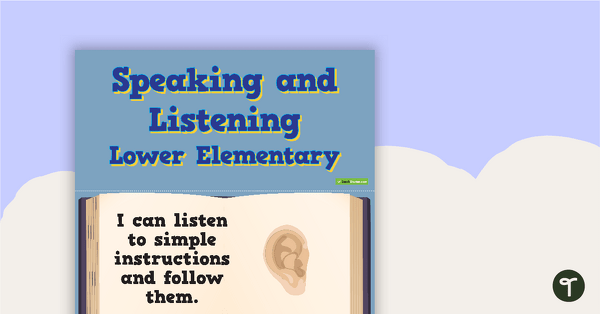
'I Can' Statements - Speaking and Listening (Lower Elementary)
A set of 13 'I can' statement cards focusing on speaking and listening for lower elementary.
- Plus Plan
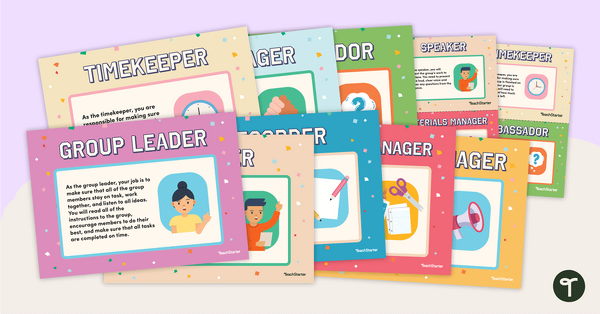
Group Work Role Cards
Review and reinforce eight possible roles for group work with this set of 2-in-1 reusable posters and desk cards.